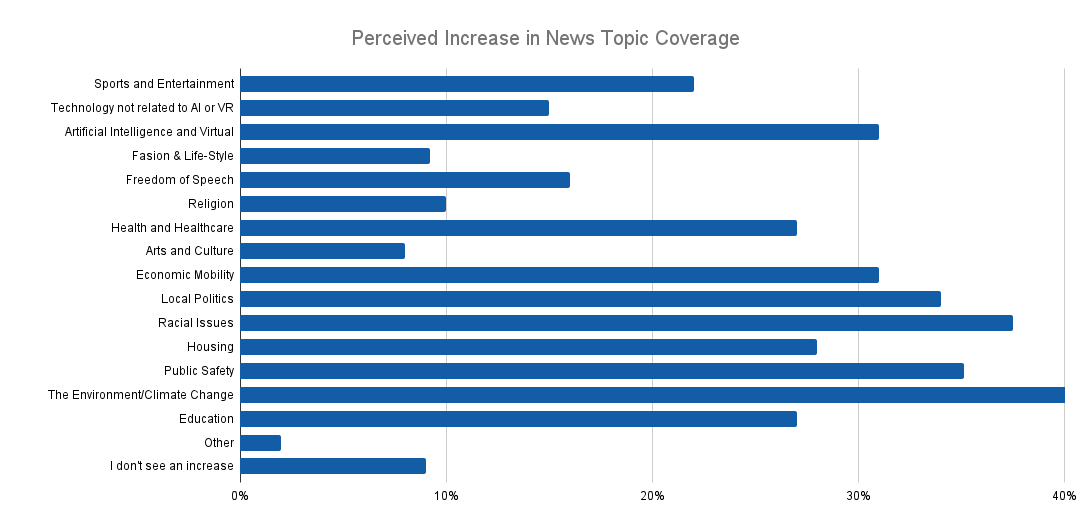Attitudes Towards Philanthropies Supporting Local News Media
Posting: Wednesday, June 5, 2024
As philanthropic support of local news moves from novelty to mainstream, the practice has rightfully come under increasing scrutiny. To explore that intersection, Journalism Funding Partners (JFP) commissioned research, conducted by the MC7770 Research Team at Bowling Green State University, to elevate that conversation from speculation to reality.
The results are promising. Our findings reveal that audiences generally hold a somewhat positive or very positive impression of philanthropies supporting local media, with 33% expressing favorable attitudes. This figure is three times higher than the 13% who have a negative view of such funding. Interestingly, more than half of the consumers reported neutral impressions, neither positive nor negative, indicating a potential area for increased education and awareness about the benefits of philanthropic support in journalism.
Impact on Journalism Quality
Despite some skepticism about the impact of funded journalism on local news, those who believe that philanthropic funding leads to better quality journalism outnumber those who think it results in poorer quality journalism by a ratio of two to one. This suggests that, while there is a segment of the population that is unsure or neutral, those with a definitive opinion are more likely to see the positive outcomes of such funding.
Best Practices for Philanthropic Funding in Journalism
To ensure that philanthropic support effectively enhances local journalism without compromising editorial integrity, several best practices arose from the findings. These include goal alignment, maintaining editorial independence and ensuring transparency in funding.
Goal Alignment: It’s crucial for funders and news organizations to have aligned objectives. Michael Anastasi, Vice President of Local News of the USA Today Network, highlights this, stating, "Our goals are aligned with JFP's goals. We want to do journalism, quality journalism that impacts the world. And I think that's what JFP is also looking for us to do. So, I don't see JFP influencing us in any way. What they want is for us to do what we do and to do it very well."
Maintaining Editorial Independence: Ensuring that news organizations retain full editorial control is paramount. Russell Campbell, Director of Science Communication and Senior Communication Officer of the Burroughs Wellcome Fund, emphasizes, "Any attempt by funders to influence editorial content undermines the integrity of journalism and erodes public trust."
Similarly, Aidan Berger of the McGovern Foundation explains, "We are very hands-off with that funding. If we think that you are doing work that aligns with our goals, and we give you funding, we are not going to come in every quarter and say, 'Hey, how about a story about this?' That is not how we operate."
Transparency of Funding: Transparency about the sources and uses of funding helps build trust with the audience. Diogo Freire, Director at Green South Foundation, underscored the importance of clarity and transparency to maintain credibility and foster trust within communities.
Additionally, Freire added, by maintaining clarity on editorial expectations, the foundation mitigates the risk of potential conflicts of interest, safeguarding the impartiality and reliability of the news content produced with their support.
The study reveals that consumers believe philanthropically funded news outlets are better positioned to deliver in-depth, investigative reporting on critical issues without the constraints imposed by commercial pressures. This aligns with the broader movement towards supporting nonprofit journalism, which is seen as a vital component in maintaining a well-informed and engaged public. These insights underscore the importance of continued investment in philanthropic funding models to sustain high-quality journalism that serves the public good.
Recommendations
Based on interviews and analysis of agreements between JFP as the fiscal sponsor, foundations as funding partners and funded news organizations, the research recommends that all parties explicitly state their commitment to editorial independence in their agreements. (This is standard in all JFP agreements.) This helps ensure a mutual understanding and mitigates the risk of misinterpretation, fostering a more robust and trustworthy partnership.
Conclusion
Philanthropic funding is increasingly seen as a viable and trustworthy alternative to commercial funding for local journalism. With the right practices in place, it has the potential to significantly enhance the quality of journalism and foster informed civic engagement, thereby strengthening communities. As we move forward, embracing these best practices will be essential in maintaining the integrity and impact of funded journalism.
Read the full report here. Onward.
Rusty Coats
Executive Director, Journalism Funding Partners
###
Media Contact: Rusty Coats, Executive Director | rusty@jfp-local.org | (813) 277-8959




